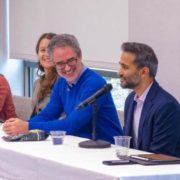CECE Launch
Authored by Justine Williams.
“The new cross-campus Center for Environment, Community, and Equity was born out of a pretty simple observation,” said Simon Nicholson, CECE Director and SIS Associate Professor. “We have amazing people doing environmental work, and we don’t know each other.” At our launch event, we asked attendees where AU’s strengths in environmental work lie. The responses ranged from Kogod’s Sustainability Management Course, to AU’s Office of Sustainability, equity and justice focused research initiatives at SIS, top-notch scientific inquiry in the department of Environmental Science, not to mention the Program in Environmental and Energy Law, the Center for Environmental Policy, and the Center for Environmental Filmmaking. The university’s willingness to work for change has been reflected in the kind of work and academic journey faculty seek to offer their students. During their remarks, CECE Associate Directors Garrett Graddy-Lovelace and Sauleh Siddiqui highlighted how important cross-disciplinary work is to AU. Dr. Graddy-Lovelace spoke on the centrality of “community” for CECE and highlighted the importance of centering front-line communities in analyses of environmental issues. Malini Ranganathan, Associate Professor at SIS and CECE faculty affiliate, spoke about possibilities to work together across-campus to address climate injustices in the D.C. region. She emphasized the fact that “climate” and “justice” don’t exist in vacuums, and urged us to consider the intersections between climate, justice, and food access. Vice Provost Diana Burley stopped in to congratulate the many faculty and staff in the room who have been involved in dreaming up CECE for almost a decade. “CECE’s approach to attack problems from a multidisciplinary perspective just makes it all the more powerful,” she shared. “Real world problems do not have disciplinary solutions.” Finally, keynote speaker Maxine Burkett, Deputy Assistant Secretary for Oceans, Fisheries and Polar Affairs at the U.S. Department of State shared her optimism that climate and environmental equity-centered planning and policy can improve well-being in communities. “Each of us has an environment in which we are deeply invested in. Each of us should have an opportunity to determine its future.”

